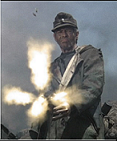Capt. Harlock
Posts: 5358
Joined: 9/15/2001
From: Los Angeles
Status: offline

|
150 Years Ago Today:
In Arkansas, Union commander Curtis played to his strength. Though he had fewer men, Union artillery was generally superior to what the Confederates had. (Most of the Confederate cannon were captured from the Yankees, and Southern powder was usually inferior to what the Northern factories produced.) Twenty-one Northern guns under Colonel Franz Sigel were lined up against the Southern position, and shortly after 8:00 am, the cannonade began.

It proved more effective than the Union commanders could have guessed. The Southerners had fewer guns on hand to reply with, and they soon ran low on ammunition. With the Confederate artillery effectively silenced, Sigel ordered his guns to be turned on the rebel infantry in the woods nearby. In most cases the trees would have given some protection, but now a combination of wood splinters and stone chips from the rocky ground made for effective shrapnel. Between hard marching and fighting, short rations, and the hammering they received, the Confederate troops reached the limit of their endurance. When Sigel sent his infantry forward in a spirited charge, the Southern lines broke.
The resulting confusion actually worked to the Confederates' advantage, for the Union pursuit took the wrong road while the the main body escaped. Still, the Battle of Pea Ridge was the largest Civil War battle fought west of the Mississippi, and the greatest victory won by an outnumbered Union force. Union losses came to 203 killed, 980 wounded and 201 missing. Van Dorn listed 800 killed and wounded, and from 200 to 300 captured. He did not mention that thousands of Missourians and Cherokee deserted, leaving him with a considerably smaller army.

However, on the east coast of the country, the South won a smashing victory. The ironclad CSS Virginia was finally ready, and accompanied by the James River Squadron of five smaller gunboats, she sailed into the anchorage at Hampton Roads. There were five Northern warships in the roadstead: the sloop-of-war USS Cumberland, frigates Congress and St. Lawrence and the steam frigates Roanoke and Minnesota. The latter three got under way when they saw Virginia approaching, but all soon ran aground in the shallow waters.
Virginia headed directly for the Union squadron, holding her fire until well within range of Cumberland. Both Cumberland and Congress replied, but their shot bounced off, doing little harm. Virginia had also been equipped with an iron ram below the waterline, and she used it on Cumberland. The Northern frigate sank rapidly, threatening to take Virginia down with her until the ram broke off.

Next, the Virginia turned on Congress. Seeing what had happened to Cumberland, the captain of the Congress deliberately ran aground. Now, none of the Union warships could move, but the guns of both Congress and Minnesota could reach Virginia, as could some of the Union shore batteries. It seemed to make no difference. By this time, the James River Squadron had arrived, and added their guns in the bombardment of Congress. After an hour of brutal punishment, the Congress ran up the white flag. However, a Union battery on the north shore opened fire on Virginia while the remaining crew of Congress were being ferried off. An angered Captain Buchanan had hot shot fired into the Northern ship, setting her ablaze. He also unwisely climbed out on top of Virginia with a rifle, and received a ball in the thigh from a Union sharpshooter.
Taking stock, Virginia was found to be moderately damaged. Shots from various enemy guns had holed her smokestack, which lowered her already poor speed. Two of her guns had been knocked out, and armor plates had been loosened.
The biggest prize in the Union flotilla was Minnesota, now helplessly aground. The tide was falling, however, meaning Virginia was unable to get close enough to be effective, and darkness was coming on. Virginia steamed away, expecting to make repairs and complete the destruction of Minnesota the next day. With two ships lost, 260 men killed and over 100 more wounded, not until Pearl Harbor would the U.S. Navy have a worse defeat.
During the night, the flames finally reached the Congress' magazines, and she blew up. Had there been any Confederates nearby, the explosion might have shown them an extraordinary new ship now in the anchorage. The USS Monitor had arrived.
 Attachment (3) Attachment (3)
< Message edited by Capt. Harlock -- 3/9/2012 5:03:28 AM >
_____________________________
Civil war? What does that mean? Is there any foreign war? Isn't every war fought between men, between brothers?
--Victor Hugo
|
 Printable Version
Printable Version































 I don't know if this is old news to you guys in the states, but this is the first time I have seen this.
I don't know if this is old news to you guys in the states, but this is the first time I have seen this. 
 New Messages
New Messages No New Messages
No New Messages Hot Topic w/ New Messages
Hot Topic w/ New Messages Hot Topic w/o New Messages
Hot Topic w/o New Messages Locked w/ New Messages
Locked w/ New Messages Locked w/o New Messages
Locked w/o New Messages Post New Thread
Post New Thread